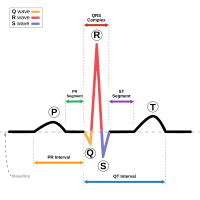
Photo from wikipedia
Abstract The applicability of several fatigue damage models for polyether ether ketone (PEEK) under mean strain and variable amplitude multi-block loadings is evaluated. The models utilized in this study are… Click to show full abstract
Abstract The applicability of several fatigue damage models for polyether ether ketone (PEEK) under mean strain and variable amplitude multi-block loadings is evaluated. The models utilized in this study are assessed against experimental data for PEEK under various cyclic loading conditions, including (1) constant amplitude loading with non-zero mean strains, (2) two-block loading with zero and non-zero mean strains, and (3) three- and four-block loading with zero mean strain. Several fatigue models, including a strain-based, a strain-stress-based, and an energy-based, are employed to correct for the effect of mean strain and stress on fatigue behavior of PEEK. Among these models, the energy-based approach, which considers the deformation response of the material throughout its entire life, better correlates the PEEK experimental data in the presence of mean strain. For specimens under block loading, three different damage accumulation models are employed to evaluate their applicability for PEEK. These include the Linear Damage Rule, as well as the non-linear Damage Curve Approach and Hashin-Rotem model. Additionally, a Direct Cumulative Damage (DCD) approach using an energy-based parameter is also employed to account for the load history and sequence effect on PEEK fatigue behavior. The DCD method is found to provide acceptable fatigue life predictions for PEEK under multi-block loading with various strain ratios and frequencies.
Journal Title: International Journal of Fatigue
Year Published: 2017
Link to full text (if available)
Share on Social Media: Sign Up to like & get
recommendations!